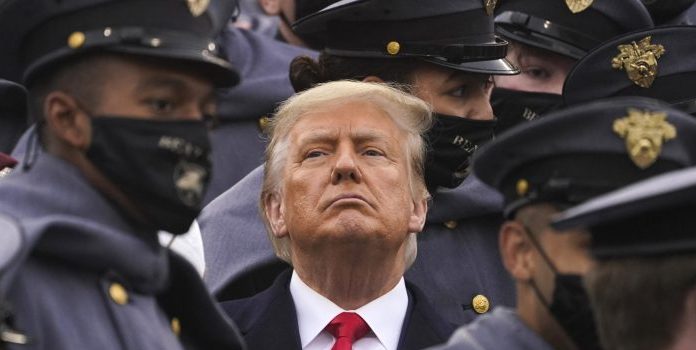(Headline USA) President Donald Trump made good on his prior promise to veto a defense appropriations bill that Congress planned to use it as a vehicle to spread cancel culture, government waste and Chinese kickbacks.
But with strong bipartisan support in Congress, it was unclear whether the move would have any actual impact or if it would be more of a symbolic gesture.
Both the House and Senate passed the National Defense Authorization Act by margins large enough to override a veto from the president.
The increasingly partisan rifts over the NDAA became apparent earlier this year as Democrats, led by Sen. Elizabeth Warren, D-Mass., threatened to withdraw their support during summertime race-riots and the widespread destruction of national monuments.
Trump responded by dangling a veto threat for the NDAA if Republican senators caved on renaming of military bases such as Fort Benning and Fort Hood that honored Confederate generals.
Trump also recently suggested that he also would leverage one of his own legislative priorities—a revision of Section 230 of the Communications Decency Act that would eliminate liability protections for online publishers like Twitter and Facebook if they cease to act as open public forums for expression.
According to the Associated Press, the rarely-controversial “bipartisan” bill would affirm “3% pay raises for U.S. troops and authorizes more than $740 billion in military programs and construction.”
But Members of Congress have often used the crucial appropriations measure as an opportunity for a pork free-for-all to redirect tax coffers to their pet causes.
After agreeing to sign the 2018 NDAA omnibus, Trump had vowed never to sign another bill like that again, reported Fox News.
“It’s not right and it’s very bad for our country,” he said of that bill, the second-largest ever at the time, reaching $1.3 trillion.
“There are a lot of things that I’m unhappy about in this bill. There are a lot of things that we shouldn’t have had in this bill, but we were, in a sense, forced—if we want to build our military—we were forced to have.”
The coronavirus pandemic, however, has continued to exacerbate Congress’s spending problem, and the NDAA comes on the heels of an unwieldy, nearly $1 trillion economic stimulus package that Trump also threatened to veto on Tuesday evening.
That bill offered paltry payments of $600 for eligible American taxpayers while funneling billions to Middle Eastern causes like a border wall between Jordan and Syria and a gender-studies program for the Afghan military.
With regard to the NDAA, Trump said the biggest winner stands to be China, which has been a growing security threat not only due to the coronavirus, but also its possible role in vote fraud and a major hacking scandal.
In advance of the veto, Senate Majority Leader Mitch McConnell, R-Ky., has said the bill would help deter Chinese aggression.
Other GOP backers of the measure, including Sen. John Thune of South Dakota, the second-ranking Senate leader, and Rep. Mike Gallagher of Wisconsin, a member of the House Armed Services Committee, have tweeted that the bill would counter threats from countries such as China.
Republican Sen. James Inhofe of Oklahoma, chairman of the Senate Armed Services Committee, hopes the veto will be overridden.
“This NDAA cements all the remarkable gains our military has made thanks to President Trump’s leadership and sends a strong message of support to our service members and their families,” he said in a statement. “I hope all of my colleagues in Congress will join me in making sure our troops have the resources and equipment they need to defend this nation.”
“We can and should use another legislative vehicle to repeal Section 230 of the Communications Decency Act – a priority the President and I share,” he added.
The measure guides Pentagon policy and cements decisions about troop levels, new weapons systems and military readiness, military personnel policy and other military goals.
Many programs can only go into effect if the bill is approved, including military construction.
McConnell, in a rare break with Trump, had urged passage despite Trump’s threat to veto it.
McConnell said it was important for Congress to continue its nearly six-decade-long streak of passing the defense policy bill.
Trump had vetoed eight bills previously, but those vetoes were sustained because supporters did not gain the two-thirds vote needed in each chamber for the bill to become law without Trump’s signature.
Adapted from reporting by Associated Press.

